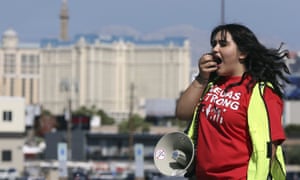Extract from The Guardian
Increasing automation has become a sticking point alongside other issues that could see workers bring city to a standstill
At the Tipsy Robot in Las Vegas,
a mechanical arm mixes cocktails that patrons order on tablet
computers. “Galactic ambassadors” – human waitresses in shiny silver
skirts – are sometimes available to deliver drinks. But the underlying
message at the future-themed bar is that humans are irrelevant.
It’s a novelty experience, but the future Tipsy Robot represents is one of several issues that may lead tens of thousands of Las Vegas hotel employees to strike in the coming days.
The action could be a citywide resort strike, with dozens of casinos impacted.
The contracts between Nevada’s largest hospitality companies – most notably MGM Resorts International – and an estimated 38,000 bartenders, cocktail servers, maids, cooks and others staff, expired 1 June. The Culinary and Bartenders Unions, which represent resort workers in the negotiations for a new five-year contract, say wage increases, workload quotas and job security threats posed by automation are the sticking points.
Caesars Entertainment reached an agreement for its 12,000 union workers on Friday. But the months’ long labor talks are on pause with the other resort companies, which together account for 25 Las Vegas hotels.
Strike dates have not been set, but staff at iconic properties like
the Bellagio, Mandalay Bay, Circus Circus and The Mirage are ready to
picket.
This comes at one of the most lucrative moments in the strip’s recent history. The Vegas Golden Knights are skating in the Stanley Cup finals at the MGM Resorts-owned T-Mobile Arena in their inaugural season. Bars and sports books are packed with fans wearing hockey jerseys, leading some to wonder what would happen if the gambling palaces shut down.

It’s a novelty experience, but the future Tipsy Robot represents is one of several issues that may lead tens of thousands of Las Vegas hotel employees to strike in the coming days.
The action could be a citywide resort strike, with dozens of casinos impacted.
The contracts between Nevada’s largest hospitality companies – most notably MGM Resorts International – and an estimated 38,000 bartenders, cocktail servers, maids, cooks and others staff, expired 1 June. The Culinary and Bartenders Unions, which represent resort workers in the negotiations for a new five-year contract, say wage increases, workload quotas and job security threats posed by automation are the sticking points.
Caesars Entertainment reached an agreement for its 12,000 union workers on Friday. But the months’ long labor talks are on pause with the other resort companies, which together account for 25 Las Vegas hotels.
This comes at one of the most lucrative moments in the strip’s recent history. The Vegas Golden Knights are skating in the Stanley Cup finals at the MGM Resorts-owned T-Mobile Arena in their inaugural season. Bars and sports books are packed with fans wearing hockey jerseys, leading some to wonder what would happen if the gambling palaces shut down.

“We know that MGM for example is doing $3-4bn dollar buyback of stocks from their investors and we’re making the argument that workers are their best shareholders,” Bethany Khan, the Culinary Union spokeswoman, said. “We’ve been sacrificing for many years – especially during the great recession we decided to forgo wage increases so the companies could remain profitable. Now they are, so as their best investors we want a fair share of that.”
If it were to last as long as the previous Las Vegas resort strike – 67 days in 1984 – Culinary estimates the work stoppage could cost MGM Resorts $200m, a heavy price to pay for a fleet of robots, which account for another hang-up in negotiations.
"We know technology is coming, but we want to have a say in how it is implemented"
Machines have already replaced the “change girls” who once roamed the casino floor. Since then prep cooks and bakers have seen positions dwindle due to mass food prep and commissary kitchen operations. Most recently, robot room service and digital check-in kiosks have threatened job security.
“We know technology is coming, but we want to have a say in how it is implemented,” Khan said. “Be it monitoring the robot, stocking the robot, or whatever – as the jobs change inevitably workers should have opportunities to train for those new jobs. And if they can’t or won’t, they should receive generous severance packages.”
Sexual harassment and safety is also a concern. The companies have tentatively agreed to provide alarm buttons to women who enter hotel rooms alone. Unions claim that management could do more to tackle aggressive sexual behavior by high rollers and other VIP clientele on the casino floor too, so the union is seeking new policies to handle those situations as well.
Kayla Cinnamon, a bartender at the El Cortez, said that though she hadn’t experienced sexual harassment personally, she was willing to strike for those protections out of solidarity to other women. “It’s important we get our rights taken care of. That’s the point of having a union,” she added.

In an email statement, MGM Resorts said, “We remain dedicated to negotiating a contract that demonstrates our commitment to employees and their families while our company continues creating good jobs and future opportunities in Las Vegas.”
The firm added: “We do not tolerate sexual harassment and have made a unequivocal commitment to our employees to take all necessary measures to protect them from any such behavior. MGM Resorts and the Culinary and Bartenders Unions are working on completing contract language that expresses our mutual commitment to protecting employees from workplace harassment.”
Danielle Fetters, a cocktail waitress at the Mirage, said she’s anxious that the labor standoff will threaten gains already made and hopes the union settles for what’s on the table now.
At the same time, Fetters and her colleagues on the casino floor are “legitimately worried” that touchscreen beverage ordering systems will soon diminish their roles serving slot machine players. That software is already being piloted in some casinos, where complimentary drinks are tied to the time and money a player spends gambling.
“You used to get cigarettes and rooms and buffets and this really cool stuff,” she said.” “Now they’re so tight with everything, even though they’re making more money – and they want to get away from having cocktail waitresses? The art of customer service is completely gone. Don’t start with all this BS that you’re there for hospitality when you’re turning everything over to machines. It’s going to eliminate a lot of jobs for us, and then where do we go? This has been everything I know for my entire adult life.”
At the Fremont casino in downtown Las Vegas, Ivan, a bartender with a Russian accent, said the strike was a good, principled stand to allow workers to share in the resorts’ profits, but he’s not yet worried about automation.
“Sooner or later it’s going to happen, but robots can’t beat us yet. At high volume places I don’t see it, and high-end places no way. It’s a social environment too. It’s not just about getting a drink.”

No comments:
Post a Comment